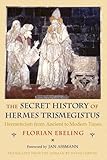The Secret History of Hermes Trismegistus : Hermeticism from Ancient to Modern Times / Florian Ebeling.
Material type: TextPublisher: Ithaca, NY : Cornell University Press, [2011]Copyright date: 2011Description: 1 online resource (176 p.) : 8 halftonesContent type:
TextPublisher: Ithaca, NY : Cornell University Press, [2011]Copyright date: 2011Description: 1 online resource (176 p.) : 8 halftonesContent type: - 9780801464829
- Hermetism -- History
- Consumer Health & Fitness
- History
- Philosophy
- PHILOSOPHY / History & Surveys / Ancient & Classical
- History of scholarship on the Hermetica
- Marsilio Ficino
- alchemy
- alkemy
- ancient religion
- ancient religious studies
- ancient theology
- arab hermeticism
- christian hermeticism
- corupus hermeticum
- cosmology
- egyptian god thoth
- egyptian hermes trismegistus
- egyptian sage
- egyptology
- esoteric hermeticism
- estoterica
- greek god hermes
- hellenism
- hellenistic egypt
- hermes astrologer
- hermes philosophy
- hermes theology
- hermes trismegistus
- hermetic alchemy
- hermetic discourse
- hermetic enlightenment
- hermetic philosophy
- hermetic texts
- hermetic thought
- hermetic traditions
- hermetic writing
- hermetica
- hermeticism
- hermetism
- hermetists
- history of hermetism
- italian renaissance philosophy
- late antiquity
- marsilio finico
- medievel hermeticism
- new age mysticism
- occultism
- old kingdom egytian gods
- prisca theologia
- pseudepigrapha
- religious hermeticism
- religious studies
- renaissance heremeticism
- the emerald tablet
- thrice-great Hermes
- umberto eco's hermetic semiosis
- western cultural memory
- what are hermetic texts
- what is hermeticism?
- what is paracelsim
- world history
- 135/.45 22
- online - DeGruyter
| Item type | Current library | Call number | URL | Status | Notes | Barcode | |
|---|---|---|---|---|---|---|---|
 eBook
eBook
|
Biblioteca "Angelicum" Pont. Univ. S.Tommaso d'Aquino Nuvola online | online - DeGruyter (Browse shelf(Opens below)) | Online access | Not for loan (Accesso limitato) | Accesso per gli utenti autorizzati / Access for authorized users | (dgr)9780801464829 |
Frontmatter -- Contents -- Foreword -- Introduction -- I. Prehistory and Early History of a Phantasm -- II. The Middle Ages: Christian Theology and “Antediluvian” Magic -- III. Renaissance: Primeval Wisdom for a New World -- IV. Seventeenth Century: High Point and Decline -- V. Eighteenth and Nineteenth Centuries: Between Occultism and Enlightenment -- VI. Twentieth Century: Systems and Esoterica -- Chronology -- Chronology -- Select Bibliography -- Index
restricted access online access with authorization star
http://purl.org/coar/access_right/c_16ec
"Perhaps Hermeticism has fascinated so many people precisely because it has made it possible to produce many analogies and relationships to various traditions: to Platonism in its many varieties, to Stoicism, to Gnostic ideas, and even to certain Aristotelian doctrines. The Gnostic, the esoteric, the Platonist, or the deist has each been able to find something familiar in the writings. One just had to have a penchant for remote antiquity, for the idea of a Golden Age, in order for Hermeticism, with its aura of an ancient Egyptian revelation, to have enjoyed such outstanding success."—from the IntroductionHermes Trismegistus, "thrice-great Hermes," emerged from the amalgamation of the wisdom gods Hermes and Thoth and is one of the most enigmatic figures of intellectual history. Since antiquity, the legendary "wise Egyptian" has been considered the creator of several mystical and magical writings on such topics as alchemy, astrology, medicine, and the transcendence of God. Philosophers of the Renaissance celebrated Hermes Trismegistus as the founder of philosophy, Freemasons called him their forefather, and Enlightenment thinkers championed religious tolerance in his name. To this day, Hermes Trismegistus is one of the central figures of the occult—his name is synonymous with the esoteric.In this scholarly yet accessible introduction to the history of Hermeticism and its mythical founder, Florian Ebeling provides a concise overview of the Corpus Hermeticum and other writings attributed to Hermes. He traces the impact of Christian and Muslim versions of the figure in medieval Europe, the power of Hermeticism and Paracelsian belief in Renaissance thought, the relationship to Pietism and to Freemasonry in early modern Europe, and the relationship to esotericism and semiotics in the modern world.
Mode of access: Internet via World Wide Web.
In English.
Description based on online resource; title from PDF title page (publisher's Web site, viewed 26. Aug 2024)


